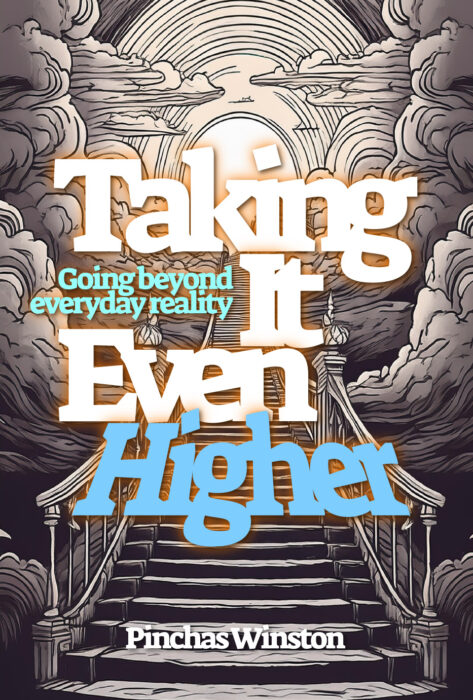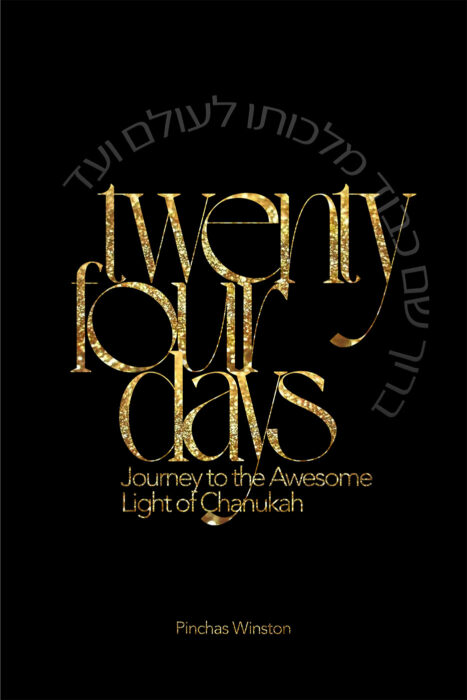Parashas Shemini, Issue #990 – By Rabbi Pinchas Winston
Shabbos Night
FOR ABOUT A year now, I have been going for an early morning walk, kind of my pre-dovening hisbodedus (meditation). It is still dark outside, and very quiet. I started going for exercise at first when my runner went on the fritz, but I continued after it was fixed because I realized that it had something my runner can’t give me: the sound of silence.
Just this morning before going out for my walk, I saw a booklet at the shul in which I doven. I usually drop my tallis and tefillin off at my shul before walking, so I can return straight there on my way back. The book was titled, “How Cell Phones Try to Take Over Our Lives,” or something to that effect. I didn’t have time to look through it much, but I got the gist of it and used my imagination for the rest.
We are living in one of the noisiest, most distracting non-war generations ever, literally an era of sounds. Rarely a minyan happens without some cell phone going off “accidentally,” and seemingly always during Shemoneh Esrai. Then there is the person who likes to hear their phone beep every time a text message or e-mail comes in, disturbing those around them.
And somewhere off in the distance there is always a truck, or even a car, beeping in reverse, while someone close by plays on some kind of device that also makes weird sounds. Thank God for Shabbos, without which the sounds would continue seven days a week, as they do for those who do not observe Shabbos. I wouldn’t be surprised if some people going to libraries just to find some silence.
This makes mindfulness more difficult. It is hard to be in the zone when so many external things are happening all around. It is possible to concentrate when it is noisy, but much easier to do so when all is quiet. I think this is what I enjoy most about my morning walks—I don’t have to try to concentrate. It happens automatically.
As a result, I have come up with some nice insights, thank God, while walking in the quiet of early morning. In fact, I try to have a question in mind before I start on my way so that I can think about it as I walk. Invariably, I usually come up with any answer, which I quickly jot down in my note book once I return to shul. It’s a very rewarding experience, and one that I look forward to each day, even when tired. I have even gone on my walks in the rain.
Shabbos Day
THE TALMUD SAYS that if a person wants to truly learn Torah, they should make themself like a midbar—a desert:
If you make yourself into a midbar, then your Torah will remain. (Eiruvin 54a)
The simple explanation is that a desert symbolizes humility, being ownerless and a place that everyone tramples. Nothing much grows there, and though it has its own kind of beauty, it is not one that draws people there in droves. If anything, it reminds people of death more than life.
But this is not a contradiction of the fact that Torah is called a “tree of life.” Ironically, to access this tree of life the Talmud also says, one must make themself like a dead person, as the Rambam, explains:
Words of Torah do not endure for those who are lazy concerning [studying] them, and not for those who study amidst pleasure and eating and drinking. Rather, [it endures] for the one who gives up his life for them (words of Torah) and constantly strains his body, not giving any sleep to his eyes nor slumber to his eyelids. The Rabbis said, in a manner of allusion [regarding the verse], “This is the law if a man should die in a tent” (Bamidbar 19:14), that the Torah only endures for the one who dies for it in the tents of the wise…The Rabbis have said that a covenant is established that anyone who exhausts himself in his Torah study in the Bais Midrash will not forget it quickly. And anyone who exhausts himself in Torah study in private will become wise, as it says: “To the modest will come wisdom” (Mishlei 11:2). (Yad, Hilchos Talmud Torah 3:12)
The Rambam is clearly taking about self-sacrifice for Torah, and like anything in life, the more of yourself you give to know it, the more you are able to acquire it. He has also added the need to limit the pursuit of material pleasures because Torah is a spiritual pursuit, and as the Talmud says, the pursuit of one is usually at the cost of the other (Brochos 5b). This is why elsewhere the Talmud says that Torah comes from the mouths of the poor (Nedarim 81a).
This is, of course, 100 percent true and a golden rule of learning Torah, though people still try to eat from both “tables.” But perhaps there is another aspect that is being overlooked, one that has to do with another quality of a desert and deserted places in general: quiet.
Interestingly enough, the word for “noise” is “ra’ash,” spelled Raish-Ayin-Shin. They happen to be the three letters for “rasha,” which is an evil person, because evil people tend to make a lot of noise. As it says in the Talmud regarding Ephron who sold Ma’aras Hamakpelah to Avraham (Bereishis 23:16), evil people say a lot but do little.
And when its says “evil” people, it doesn’t have to mean the worst people in the world. Evil is a broad term that can also refer to actions alone, and not necessarily to the person doing them. Killing a person accidentally is also a level of evil, though the person who did it is not necessarily evil. There are people who do evil, and then there are the people who personify it. There is a difference.
On my walk in the mornings, I often walk by some teenagers who hang out in the streets at that time. They probably have good hearts and are just very confused about life, intellectually, emotionally, or both. You can feel their struggle for identity from 50 feet away, especially when they insist on talking and yelling at the top of their lungs, though people in the houses around them are still asleep. Somehow doing that makes them feel more secure.
Silence is not only golden. It can also be a sign of righteousness and wisdom.
Seudas Shlishis
THIS IDEA MAY actually open the door to a new answer to an old question regarding the prophecy Moshe Rabbeinu had about the future Rebi Akiva. The story goes like this:
When Moshe ascended on High, he found The Holy One, Blessed Is He, sitting and tying crowns on the letters [of the Torah]. He asked: “Master of the Universe, who is preventing You [from giving the Torah without these crowns]?”
[God] told him: “There is a man who is destined to be [born] after several generations, and Akiva ben Yosef is his name. He is destined to derive from each and every thorn [of these crowns] mounds upon mounds of laws.”
[Moshe] asked [God]: “Master of the Universe, show him to me!”
He told him: “Turn around.”
[Moshe] went and sat at the end of the eighth row [in Rebi Akiva’s bais midrash] and did not understand what they were saying. His strength weakened, [thinking his Torah knowledge was lacking]. When [Rebi Akiva] arrived [at the discussion of] one matter, his students questioned him: “Rebi, from where do you [derive this]?”
[Rebi Akiva] answered them: “It is a law [given] to Moshe at Sinai.”
[When Moshe heard this], his mind was put at ease, [knowing that this too was part of the Torah he was going to receive].
[Moshe] returned to before The Holy One, Blessed Is He, and said to Him: “Master of the Universe, You have a man [as great] as this and You still choose to give the Torah through me?!”
[God] answered him: “Shtok—Be silent! This arose b’mach-shavah—in the mind before Me.” (Menachos 29b)
“Be silent! This arose in the mind before Me”?! Really?
It was one thing for God to tell Moshe, “Good question, but this is what I have decided to do.” But why the “shtok—be quiet”? Even if Moshe had overstepped a boundary by questioning the way of God, he did it out of modesty, not chutzpah. It sounds as if God was reprimanding him.
Kabbalah has a better answer. God did not lose His patience with Moshe but instead told him, “I’d love to give you an answer to your question, but it exists on a very high spiritual level called “Machshavah.” It is too sublime to be expressed in words, so you’ll have to do without it.” “Shtok alludes to this.
However, maybe it means something else now. Maybe God was telling Moshe that the profound understanding he sought could only come through a desert-like silence, not words. Words convey information from the outside to the inside. The answer Moshe sought, being incredibly profound, could only come from within, like prophecy itself, as it says:
After the earthquake fire, not in the fire was God, and after the fire a still small sound. (I Melachim 19:12)
When a person blocks out the noise of the outside world, they can suddenly “hear” godly insights, profound and sublime ideas that are always there but which get blocked out by all the outside noise. The “masters of silence” have known this for a long time, and have spent considerable time in meditation for this reason. But the extent to which a person can access such “quiet” knowledge also depends upon the level of one’s soul, and Aharon HaKohen had a very high soul.
Melave Malkah
PERHAPS THIS IS why Aharon not only remained quiet at the moment when his sons Nadav and Avihu shockingly died, he was “domeim.” The verse does not say, “vayishtock Aharon—and Aharon was quiet,” it says “vayidom Aharon,” a word which means “quiet” as well, but on a more profound level.
There are four levels of reality according to Kabbalah: Domaim, Tzomayach, Chai, and Medabehr, literally: Silent, Growing, Living, and Speaking. They refer to four “worlds”: Mineral, Vegetation, Animal, and Human. A desert falls into the category of Domaim, being mostly sand and almost zero vegetation. It is certainly not a place for most animals, and humans find it inhabitable.
But, as mentioned, deserts have their own beauty. If the sun and living conditions are not a threat, there is something very peaceful and settling about a desert. It is certainly a place where a person can hear themself think, being cut off from all the distractions of bustling cities.
Perhaps this is one of the reasons why God chose to give His Torah in the desert, and not in Egypt or even in Eretz Yisroel. The isolation from the rest of society made it easier to focus on the matter at hand. It created a sense of historic uniqueness, which was crucial for Kabbalas HaTorah.
I’ve seen this difference on a much smaller scale. I have been part of a Shabbaton held in a downtown hotel, and one that was held out in the country at some lodge. The teachers were the same as was the material. The food was just as good. But the atmosphere was entirely different, being away from the hustle and bustle of the outside world. It’s just the way people work.
Maybe this is the deeper meaning of “vayidom Aharon.” It is telling us that Aharon’s response to the terrible crisis was not only not to go to pieces, which would have been understandable, but in the opposite direction. He silenced himself and shut out the entire world so he could access the great calm necessary to put the events of the moment into Divine perspective.
This would explain why, as Rashi explains, God spoke to him alone shortly after. It wasn’t just a reward for his loyalty at such a difficult moment, but actually the result of it. He made himself as quiet and humble as a domaim-desert, and the result was that the word of God came to him, from within.
Sometimes people work so hard to find answers to difficult questions in the noisy world around them. In the week’s parsha, we see how those answers are more likely to come from within us, accessible only when we achieve the profound level of personal silence necessary to hear them.
Rabbi Pinchas Winston
Thirtysix.org



















